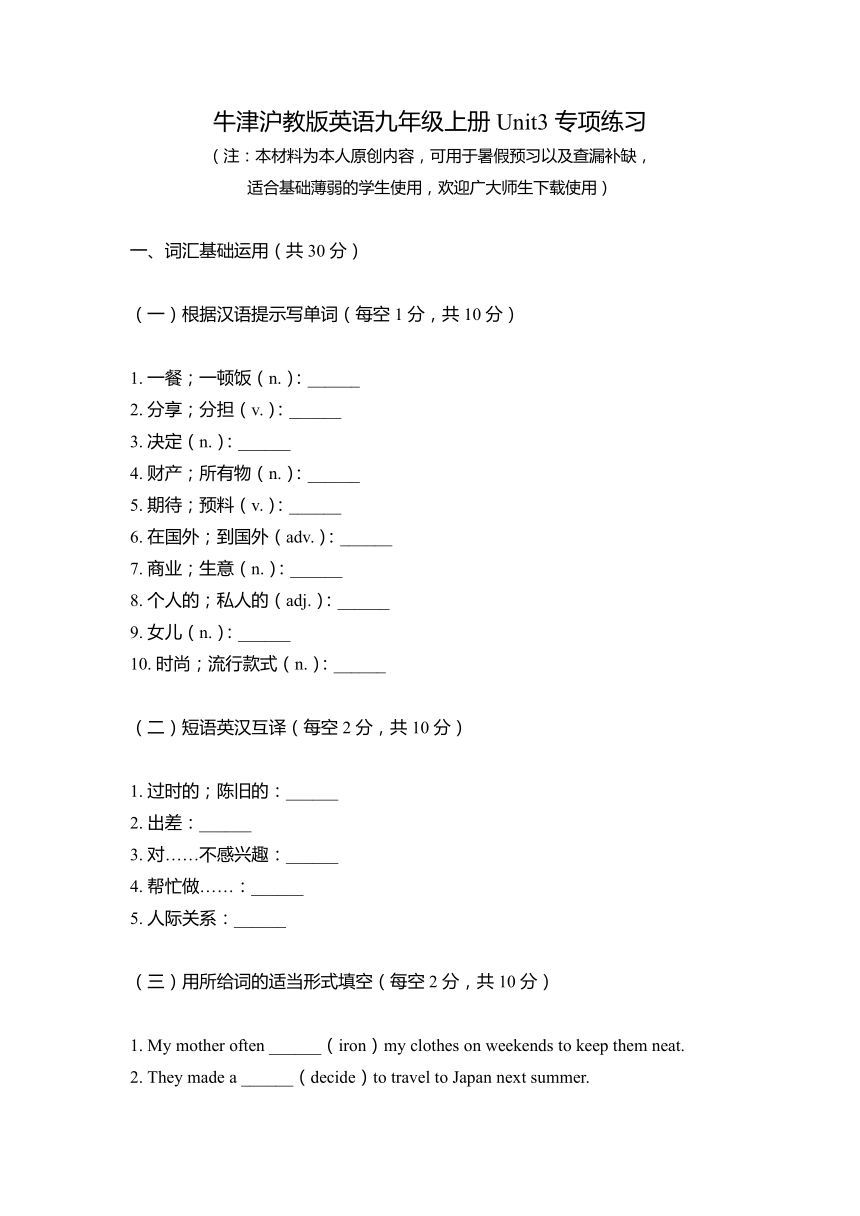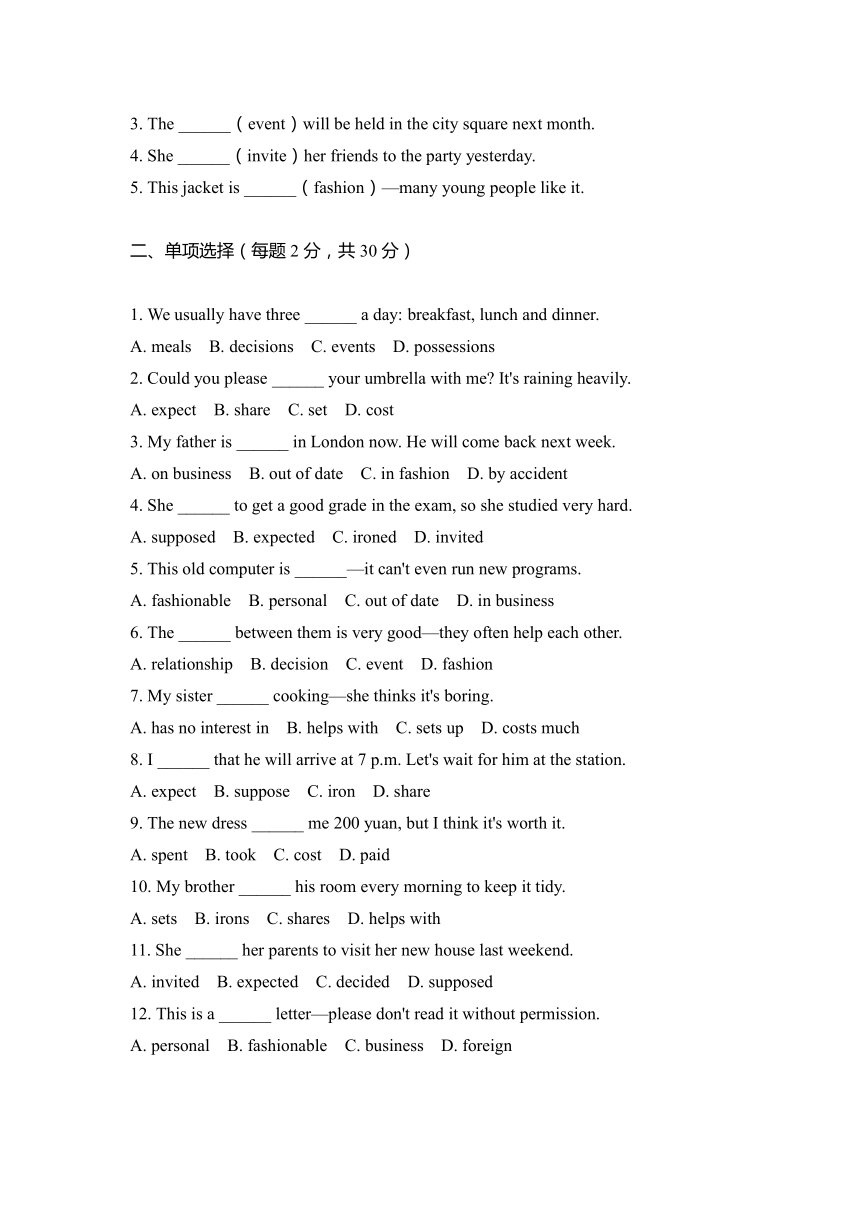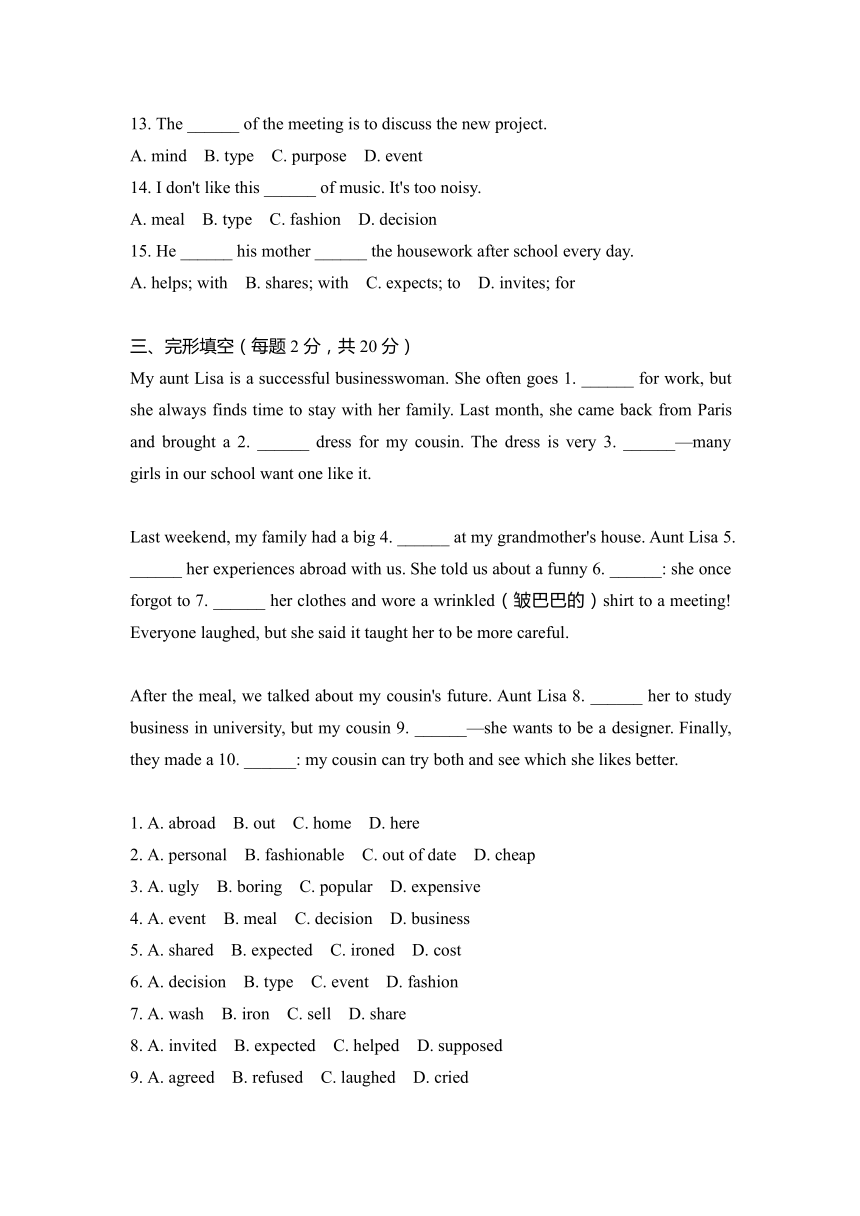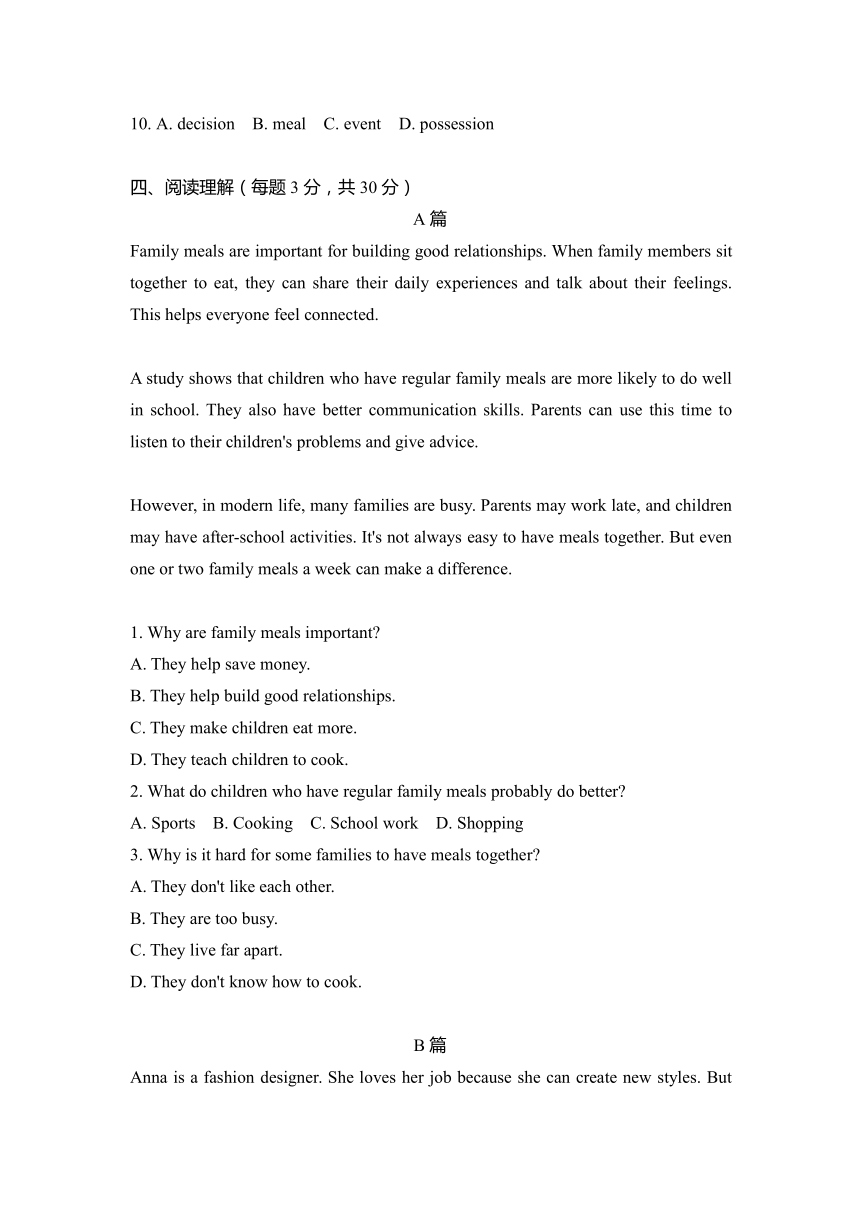Module 2 Unit 3 Family life专项练习(含解析)2025-2026学年沪教牛津版(广州深圳沈阳通用)九年级英语上册
文档属性
| 名称 | Module 2 Unit 3 Family life专项练习(含解析)2025-2026学年沪教牛津版(广州深圳沈阳通用)九年级英语上册 |  | |
| 格式 | docx | ||
| 文件大小 | 25.7KB | ||
| 资源类型 | 教案 | ||
| 版本资源 | 牛津深圳版 | ||
| 科目 | 英语 | ||
| 更新时间 | 2025-07-10 14:46:21 | ||
图片预览




文档简介
牛津沪教版英语九年级上册Unit3专项练习
(注:本材料为本人原创内容,可用于暑假预习以及查漏补缺,
适合基础薄弱的学生使用,欢迎广大师生下载使用)
一、词汇基础运用(共30分)
(一)根据汉语提示写单词(每空1分,共10分)
1. 一餐;一顿饭(n.):______
2. 分享;分担(v.):______
3. 决定(n.):______
4. 财产;所有物(n.):______
5. 期待;预料(v.):______
6. 在国外;到国外(adv.):______
7. 商业;生意(n.):______
8. 个人的;私人的(adj.):______
9. 女儿(n.):______
10. 时尚;流行款式(n.):______
(二)短语英汉互译(每空2分,共10分)
1. 过时的;陈旧的:______
2. 出差:______
3. 对……不感兴趣:______
4. 帮忙做……:______
5. 人际关系:______
(三)用所给词的适当形式填空(每空2分,共10分)
1. My mother often ______(iron)my clothes on weekends to keep them neat.
2. They made a ______(decide)to travel to Japan next summer.
3. The ______(event)will be held in the city square next month.
4. She ______(invite)her friends to the party yesterday.
5. This jacket is ______(fashion)—many young people like it.
二、单项选择(每题2分,共30分)
1. We usually have three ______ a day: breakfast, lunch and dinner.
A. meals B. decisions C. events D. possessions
2. Could you please ______ your umbrella with me It's raining heavily.
A. expect B. share C. set D. cost
3. My father is ______ in London now. He will come back next week.
A. on business B. out of date C. in fashion D. by accident
4. She ______ to get a good grade in the exam, so she studied very hard.
A. supposed B. expected C. ironed D. invited
5. This old computer is ______—it can't even run new programs.
A. fashionable B. personal C. out of date D. in business
6. The ______ between them is very good—they often help each other.
A. relationship B. decision C. event D. fashion
7. My sister ______ cooking—she thinks it's boring.
A. has no interest in B. helps with C. sets up D. costs much
8. I ______ that he will arrive at 7 p.m. Let's wait for him at the station.
A. expect B. suppose C. iron D. share
9. The new dress ______ me 200 yuan, but I think it's worth it.
A. spent B. took C. cost D. paid
10. My brother ______ his room every morning to keep it tidy.
A. sets B. irons C. shares D. helps with
11. She ______ her parents to visit her new house last weekend.
A. invited B. expected C. decided D. supposed
12. This is a ______ letter—please don't read it without permission.
A. personal B. fashionable C. business D. foreign
13. The ______ of the meeting is to discuss the new project.
A. mind B. type C. purpose D. event
14. I don't like this ______ of music. It's too noisy.
A. meal B. type C. fashion D. decision
15. He ______ his mother ______ the housework after school every day.
A. helps; with B. shares; with C. expects; to D. invites; for
三、完形填空(每题2分,共20分)
My aunt Lisa is a successful businesswoman. She often goes 1. ______ for work, but she always finds time to stay with her family. Last month, she came back from Paris and brought a 2. ______ dress for my cousin. The dress is very 3. ______—many girls in our school want one like it.
Last weekend, my family had a big 4. ______ at my grandmother's house. Aunt Lisa 5. ______ her experiences abroad with us. She told us about a funny 6. ______: she once forgot to 7. ______ her clothes and wore a wrinkled(皱巴巴的)shirt to a meeting! Everyone laughed, but she said it taught her to be more careful.
After the meal, we talked about my cousin's future. Aunt Lisa 8. ______ her to study business in university, but my cousin 9. ______—she wants to be a designer. Finally, they made a 10. ______: my cousin can try both and see which she likes better.
1. A. abroad B. out C. home D. here
2. A. personal B. fashionable C. out of date D. cheap
3. A. ugly B. boring C. popular D. expensive
4. A. event B. meal C. decision D. business
5. A. shared B. expected C. ironed D. cost
6. A. decision B. type C. event D. fashion
7. A. wash B. iron C. sell D. share
8. A. invited B. expected C. helped D. supposed
9. A. agreed B. refused C. laughed D. cried
10. A. decision B. meal C. event D. possession
四、阅读理解(每题3分,共30分)
A篇
Family meals are important for building good relationships. When family members sit together to eat, they can share their daily experiences and talk about their feelings. This helps everyone feel connected.
A study shows that children who have regular family meals are more likely to do well in school. They also have better communication skills. Parents can use this time to listen to their children's problems and give advice.
However, in modern life, many families are busy. Parents may work late, and children may have after-school activities. It's not always easy to have meals together. But even one or two family meals a week can make a difference.
1. Why are family meals important
A. They help save money.
B. They help build good relationships.
C. They make children eat more.
D. They teach children to cook.
2. What do children who have regular family meals probably do better
A. Sports B. Cooking C. School work D. Shopping
3. Why is it hard for some families to have meals together
A. They don't like each other.
B. They are too busy.
C. They live far apart.
D. They don't know how to cook.
B篇
Anna is a fashion designer. She loves her job because she can create new styles. But her parents wanted her to be a doctor—they thought fashion was "not a real job".
Last year, Anna's designs were shown at a big event in Paris. She invited her parents to come. At first, they refused, but Anna didn't give up. She sent them photos of her work, and finally they agreed.
At the event, Anna's parents saw how popular her designs were. Many people loved her clothes, and some even wanted to buy them. Her parents realized that fashion is a serious business. They apologized to Anna and said they were proud of her.
Now, Anna's parents often help her with her business. They even give her advice on how to manage her time. Anna says, "It's great to have their support. Family relationships are more important than anything else."
4. What does Anna do
A. A doctor B. A fashion designer C. A teacher D. A businesswoman
5. Why did Anna's parents refuse to go to the event at first
A. They were too busy.
B. They thought fashion was not a real job.
C. They didn't like Paris.
D. They didn't want to see Anna's designs.
6. What made Anna's parents change their minds
A. Anna's apology.
B. The success of Anna's designs.
C. The advice from other people.
D. The high cost of the event.
7. What do Anna's parents do now
A. They help Anna with her business.
B. They still want Anna to be a doctor.
C. They design clothes with Anna.
D. They refuse to talk about Anna's job.
C篇
Here are some tips for traveling abroad:
A. Learn basic words. Knowing "hello", "thank you" and "sorry" in the local language can help you communicate.
B. Pack smartly. Check the weather and pack suitable clothes. Don't forget to take a small iron—some hotels don't provide one, and you may need to iron your clothes for formal events.
C. Respect local customs. For example, in some countries, it's rude to wear shorts to a temple. Learn about these before you go.
D. Keep your personal belongings safe. Don't leave your bag unattended in public places.
E. Try local food. Sharing a meal with locals can be a great way to learn about their culture.
8. What is the second tip for traveling abroad
A. Learn basic words.
B. Pack smartly.
C. Respect local customs.
D. Try local food.
9. Why should you take a small iron when traveling
A. To save money.
B. To iron clothes for formal events.
C. To clean dirty clothes.
D. To sell to locals.
10. What can you do to learn about local culture
A. Wear shorts to temples.
B. Leave your bag in public.
C. Share a meal with locals.
D. Speak only your own language.
答案及解析
一、词汇基础运用
(一)1. meal 解析:指“一日三餐”中的任意一餐,是基础名词。
2. share 解析:常用搭配share sth. with sb.(与某人分享某物)。
3. decision 解析:由动词decide变形而来,make a decision(做决定)是固定短语。
4. possessions 解析:指个人拥有的“财产”,常用复数形式。
5. expect 解析:常用搭配expect to do sth.(期待做某事)、expect sb. to do sth.(期待某人做某事)。
6. abroad 解析:副词,如go abroad(出国)、live abroad(在国外生活)。
7. business 解析:on business(出差)是常用短语。
8. personal 解析:与“public(公共的)”相对,如personal information(个人信息)。
9. daughter 解析:对应“儿子(son)”,指女性子女。
10. fashion 解析:in fashion(流行)、out of fashion(过时)是常用搭配。
(二)1. out of date 解析:固定短语,反义词组是in fashion(流行)。
2. on business 解析:指因工作出差,如go to Shanghai on business(去上海出差)。
3. have no interest in 解析:后接名词或动名词,如have no interest in sports(对运动不感兴趣)。
4. help with 解析:help with sth.(帮忙做某事),如help with housework(帮忙做家务)。
5. relationship 解析:指人与人之间的关系,如family relationship(家庭关系)。
(三)1. irons 解析:由often可知用一般现在时,主语my mother是第三人称单数,故填irons。
2. decision 解析:不定冠词a后接名词,decide的名词形式是decision。
3. event 解析:由will be held可知指“活动”,用名词event。
4. invited 解析:由yesterday可知用一般过去时,invite的过去式是invited。
5. fashionable 解析:be动词后接形容词,fashion的形容词形式是fashionable(时尚的)。
二、单项选择
1. A 解析:由“breakfast, lunch and dinner”可知指“三餐(meals)”,其他选项不符合语境。
2. B 解析:share sth. with sb.(与某人分享某物)符合“共用雨伞”的语境,故选B。
3. A 解析:由“come back next week”可知是“出差(on business)”,其他短语不符合。
4. B 解析:expect to do sth.(期待做某事)符合“努力学习期待考好成绩”的逻辑,故选B。
5. C 解析:由“old computer”和“can't run new programs”可知是“过时的(out of date)”,故选C。
6. A 解析:“人际关系(relationship)”与“互相帮助”搭配合理,其他选项不符合。
7. A 解析:由“she thinks it's boring”可知“对烹饪不感兴趣(has no interest in)”,故选A。
8. B 解析:suppose(推测)符合“推测他晚上7点到”的语境,故选B。
9. C 解析:cost(花费)主语是物,符合“裙子花了200元”的表达,故选C。
10. D 解析:iron(熨烫)衣服能保持整洁,符合语境,故选D。
11. A 解析:由“yesterday”可知用过去式invited(邀请),故选A。
12. A 解析:“私人信件(personal letter)”对应“不要未经允许阅读”,故选A。
13. C 解析:“会议的目的(purpose)是讨论新项目”,符合逻辑,故选C。
14. B 解析:this type of music(这种类型的音乐)搭配合理,故选B。
15. A 解析:help sb. with sth.(帮某人做某事)符合“帮妈妈做家务”的语境,故选A。
三、完形填空
1. A 解析:由“businesswoman”和“experiences abroad”可知是“出国(abroad)”工作,故选A。
2. B 解析:由后文“many girls want one”可知是“时尚的(fashionable)”裙子,故选B。
3. C 解析:“受欢迎的(popular)”对应“很多女孩想要”,故选C。
4. B 解析:由后文“After the meal”可知是“一顿饭(meal)”,故选B。
5. A 解析:share...with...(与……分享……)符合“分享国外经历”的语境,故选A。
6. C 解析:“趣事(event)”对应“穿皱衬衫去开会”,故选C。
7. B 解析:由“wore a wrinkled shirt”可知是忘记“熨烫(iron)”衣服,故选B。
8. B 解析:expect sb. to do sth.(期待某人做某事)符合“期待表妹学商业”的语境,故选B。
9. B 解析:由“she wants to be a designer”可知表妹“拒绝(refused)”了,故选B。
10. A 解析:make a decision(做决定)对应“尝试两者后再选择”,故选A。
四、阅读理解
1. B 解析:由第一段“Family meals are important for building good relationships”可知。
2. C 解析:由第二段“A study shows that children who have regular family meals are more likely to do well in school”可知。
3. B 解析:由第三段“many families are busy. Parents may work late, and children may have after-school activities”可知。
4. B 解析:由第二段“Anna is a fashion designer”可知。
5. B 解析:由第二段“they thought fashion was 'not a real job'”可知。
6. B 解析:由第三段“Anna's parents saw how popular her designs were”可知。
7. A 解析:由最后一段“Anna's parents often help her with her business”可知。
8. B 解析:由Passage 3中“2. Pack smartly”可知。
9. B 解析:由“you may need to iron your clothes for formal events”可知。
10. C 解析:由“Sharing a meal with locals can be a great way to learn about their culture”可知。
(注:本材料为本人原创内容,可用于暑假预习以及查漏补缺,
适合基础薄弱的学生使用,欢迎广大师生下载使用)
一、词汇基础运用(共30分)
(一)根据汉语提示写单词(每空1分,共10分)
1. 一餐;一顿饭(n.):______
2. 分享;分担(v.):______
3. 决定(n.):______
4. 财产;所有物(n.):______
5. 期待;预料(v.):______
6. 在国外;到国外(adv.):______
7. 商业;生意(n.):______
8. 个人的;私人的(adj.):______
9. 女儿(n.):______
10. 时尚;流行款式(n.):______
(二)短语英汉互译(每空2分,共10分)
1. 过时的;陈旧的:______
2. 出差:______
3. 对……不感兴趣:______
4. 帮忙做……:______
5. 人际关系:______
(三)用所给词的适当形式填空(每空2分,共10分)
1. My mother often ______(iron)my clothes on weekends to keep them neat.
2. They made a ______(decide)to travel to Japan next summer.
3. The ______(event)will be held in the city square next month.
4. She ______(invite)her friends to the party yesterday.
5. This jacket is ______(fashion)—many young people like it.
二、单项选择(每题2分,共30分)
1. We usually have three ______ a day: breakfast, lunch and dinner.
A. meals B. decisions C. events D. possessions
2. Could you please ______ your umbrella with me It's raining heavily.
A. expect B. share C. set D. cost
3. My father is ______ in London now. He will come back next week.
A. on business B. out of date C. in fashion D. by accident
4. She ______ to get a good grade in the exam, so she studied very hard.
A. supposed B. expected C. ironed D. invited
5. This old computer is ______—it can't even run new programs.
A. fashionable B. personal C. out of date D. in business
6. The ______ between them is very good—they often help each other.
A. relationship B. decision C. event D. fashion
7. My sister ______ cooking—she thinks it's boring.
A. has no interest in B. helps with C. sets up D. costs much
8. I ______ that he will arrive at 7 p.m. Let's wait for him at the station.
A. expect B. suppose C. iron D. share
9. The new dress ______ me 200 yuan, but I think it's worth it.
A. spent B. took C. cost D. paid
10. My brother ______ his room every morning to keep it tidy.
A. sets B. irons C. shares D. helps with
11. She ______ her parents to visit her new house last weekend.
A. invited B. expected C. decided D. supposed
12. This is a ______ letter—please don't read it without permission.
A. personal B. fashionable C. business D. foreign
13. The ______ of the meeting is to discuss the new project.
A. mind B. type C. purpose D. event
14. I don't like this ______ of music. It's too noisy.
A. meal B. type C. fashion D. decision
15. He ______ his mother ______ the housework after school every day.
A. helps; with B. shares; with C. expects; to D. invites; for
三、完形填空(每题2分,共20分)
My aunt Lisa is a successful businesswoman. She often goes 1. ______ for work, but she always finds time to stay with her family. Last month, she came back from Paris and brought a 2. ______ dress for my cousin. The dress is very 3. ______—many girls in our school want one like it.
Last weekend, my family had a big 4. ______ at my grandmother's house. Aunt Lisa 5. ______ her experiences abroad with us. She told us about a funny 6. ______: she once forgot to 7. ______ her clothes and wore a wrinkled(皱巴巴的)shirt to a meeting! Everyone laughed, but she said it taught her to be more careful.
After the meal, we talked about my cousin's future. Aunt Lisa 8. ______ her to study business in university, but my cousin 9. ______—she wants to be a designer. Finally, they made a 10. ______: my cousin can try both and see which she likes better.
1. A. abroad B. out C. home D. here
2. A. personal B. fashionable C. out of date D. cheap
3. A. ugly B. boring C. popular D. expensive
4. A. event B. meal C. decision D. business
5. A. shared B. expected C. ironed D. cost
6. A. decision B. type C. event D. fashion
7. A. wash B. iron C. sell D. share
8. A. invited B. expected C. helped D. supposed
9. A. agreed B. refused C. laughed D. cried
10. A. decision B. meal C. event D. possession
四、阅读理解(每题3分,共30分)
A篇
Family meals are important for building good relationships. When family members sit together to eat, they can share their daily experiences and talk about their feelings. This helps everyone feel connected.
A study shows that children who have regular family meals are more likely to do well in school. They also have better communication skills. Parents can use this time to listen to their children's problems and give advice.
However, in modern life, many families are busy. Parents may work late, and children may have after-school activities. It's not always easy to have meals together. But even one or two family meals a week can make a difference.
1. Why are family meals important
A. They help save money.
B. They help build good relationships.
C. They make children eat more.
D. They teach children to cook.
2. What do children who have regular family meals probably do better
A. Sports B. Cooking C. School work D. Shopping
3. Why is it hard for some families to have meals together
A. They don't like each other.
B. They are too busy.
C. They live far apart.
D. They don't know how to cook.
B篇
Anna is a fashion designer. She loves her job because she can create new styles. But her parents wanted her to be a doctor—they thought fashion was "not a real job".
Last year, Anna's designs were shown at a big event in Paris. She invited her parents to come. At first, they refused, but Anna didn't give up. She sent them photos of her work, and finally they agreed.
At the event, Anna's parents saw how popular her designs were. Many people loved her clothes, and some even wanted to buy them. Her parents realized that fashion is a serious business. They apologized to Anna and said they were proud of her.
Now, Anna's parents often help her with her business. They even give her advice on how to manage her time. Anna says, "It's great to have their support. Family relationships are more important than anything else."
4. What does Anna do
A. A doctor B. A fashion designer C. A teacher D. A businesswoman
5. Why did Anna's parents refuse to go to the event at first
A. They were too busy.
B. They thought fashion was not a real job.
C. They didn't like Paris.
D. They didn't want to see Anna's designs.
6. What made Anna's parents change their minds
A. Anna's apology.
B. The success of Anna's designs.
C. The advice from other people.
D. The high cost of the event.
7. What do Anna's parents do now
A. They help Anna with her business.
B. They still want Anna to be a doctor.
C. They design clothes with Anna.
D. They refuse to talk about Anna's job.
C篇
Here are some tips for traveling abroad:
A. Learn basic words. Knowing "hello", "thank you" and "sorry" in the local language can help you communicate.
B. Pack smartly. Check the weather and pack suitable clothes. Don't forget to take a small iron—some hotels don't provide one, and you may need to iron your clothes for formal events.
C. Respect local customs. For example, in some countries, it's rude to wear shorts to a temple. Learn about these before you go.
D. Keep your personal belongings safe. Don't leave your bag unattended in public places.
E. Try local food. Sharing a meal with locals can be a great way to learn about their culture.
8. What is the second tip for traveling abroad
A. Learn basic words.
B. Pack smartly.
C. Respect local customs.
D. Try local food.
9. Why should you take a small iron when traveling
A. To save money.
B. To iron clothes for formal events.
C. To clean dirty clothes.
D. To sell to locals.
10. What can you do to learn about local culture
A. Wear shorts to temples.
B. Leave your bag in public.
C. Share a meal with locals.
D. Speak only your own language.
答案及解析
一、词汇基础运用
(一)1. meal 解析:指“一日三餐”中的任意一餐,是基础名词。
2. share 解析:常用搭配share sth. with sb.(与某人分享某物)。
3. decision 解析:由动词decide变形而来,make a decision(做决定)是固定短语。
4. possessions 解析:指个人拥有的“财产”,常用复数形式。
5. expect 解析:常用搭配expect to do sth.(期待做某事)、expect sb. to do sth.(期待某人做某事)。
6. abroad 解析:副词,如go abroad(出国)、live abroad(在国外生活)。
7. business 解析:on business(出差)是常用短语。
8. personal 解析:与“public(公共的)”相对,如personal information(个人信息)。
9. daughter 解析:对应“儿子(son)”,指女性子女。
10. fashion 解析:in fashion(流行)、out of fashion(过时)是常用搭配。
(二)1. out of date 解析:固定短语,反义词组是in fashion(流行)。
2. on business 解析:指因工作出差,如go to Shanghai on business(去上海出差)。
3. have no interest in 解析:后接名词或动名词,如have no interest in sports(对运动不感兴趣)。
4. help with 解析:help with sth.(帮忙做某事),如help with housework(帮忙做家务)。
5. relationship 解析:指人与人之间的关系,如family relationship(家庭关系)。
(三)1. irons 解析:由often可知用一般现在时,主语my mother是第三人称单数,故填irons。
2. decision 解析:不定冠词a后接名词,decide的名词形式是decision。
3. event 解析:由will be held可知指“活动”,用名词event。
4. invited 解析:由yesterday可知用一般过去时,invite的过去式是invited。
5. fashionable 解析:be动词后接形容词,fashion的形容词形式是fashionable(时尚的)。
二、单项选择
1. A 解析:由“breakfast, lunch and dinner”可知指“三餐(meals)”,其他选项不符合语境。
2. B 解析:share sth. with sb.(与某人分享某物)符合“共用雨伞”的语境,故选B。
3. A 解析:由“come back next week”可知是“出差(on business)”,其他短语不符合。
4. B 解析:expect to do sth.(期待做某事)符合“努力学习期待考好成绩”的逻辑,故选B。
5. C 解析:由“old computer”和“can't run new programs”可知是“过时的(out of date)”,故选C。
6. A 解析:“人际关系(relationship)”与“互相帮助”搭配合理,其他选项不符合。
7. A 解析:由“she thinks it's boring”可知“对烹饪不感兴趣(has no interest in)”,故选A。
8. B 解析:suppose(推测)符合“推测他晚上7点到”的语境,故选B。
9. C 解析:cost(花费)主语是物,符合“裙子花了200元”的表达,故选C。
10. D 解析:iron(熨烫)衣服能保持整洁,符合语境,故选D。
11. A 解析:由“yesterday”可知用过去式invited(邀请),故选A。
12. A 解析:“私人信件(personal letter)”对应“不要未经允许阅读”,故选A。
13. C 解析:“会议的目的(purpose)是讨论新项目”,符合逻辑,故选C。
14. B 解析:this type of music(这种类型的音乐)搭配合理,故选B。
15. A 解析:help sb. with sth.(帮某人做某事)符合“帮妈妈做家务”的语境,故选A。
三、完形填空
1. A 解析:由“businesswoman”和“experiences abroad”可知是“出国(abroad)”工作,故选A。
2. B 解析:由后文“many girls want one”可知是“时尚的(fashionable)”裙子,故选B。
3. C 解析:“受欢迎的(popular)”对应“很多女孩想要”,故选C。
4. B 解析:由后文“After the meal”可知是“一顿饭(meal)”,故选B。
5. A 解析:share...with...(与……分享……)符合“分享国外经历”的语境,故选A。
6. C 解析:“趣事(event)”对应“穿皱衬衫去开会”,故选C。
7. B 解析:由“wore a wrinkled shirt”可知是忘记“熨烫(iron)”衣服,故选B。
8. B 解析:expect sb. to do sth.(期待某人做某事)符合“期待表妹学商业”的语境,故选B。
9. B 解析:由“she wants to be a designer”可知表妹“拒绝(refused)”了,故选B。
10. A 解析:make a decision(做决定)对应“尝试两者后再选择”,故选A。
四、阅读理解
1. B 解析:由第一段“Family meals are important for building good relationships”可知。
2. C 解析:由第二段“A study shows that children who have regular family meals are more likely to do well in school”可知。
3. B 解析:由第三段“many families are busy. Parents may work late, and children may have after-school activities”可知。
4. B 解析:由第二段“Anna is a fashion designer”可知。
5. B 解析:由第二段“they thought fashion was 'not a real job'”可知。
6. B 解析:由第三段“Anna's parents saw how popular her designs were”可知。
7. A 解析:由最后一段“Anna's parents often help her with her business”可知。
8. B 解析:由Passage 3中“2. Pack smartly”可知。
9. B 解析:由“you may need to iron your clothes for formal events”可知。
10. C 解析:由“Sharing a meal with locals can be a great way to learn about their culture”可知。
